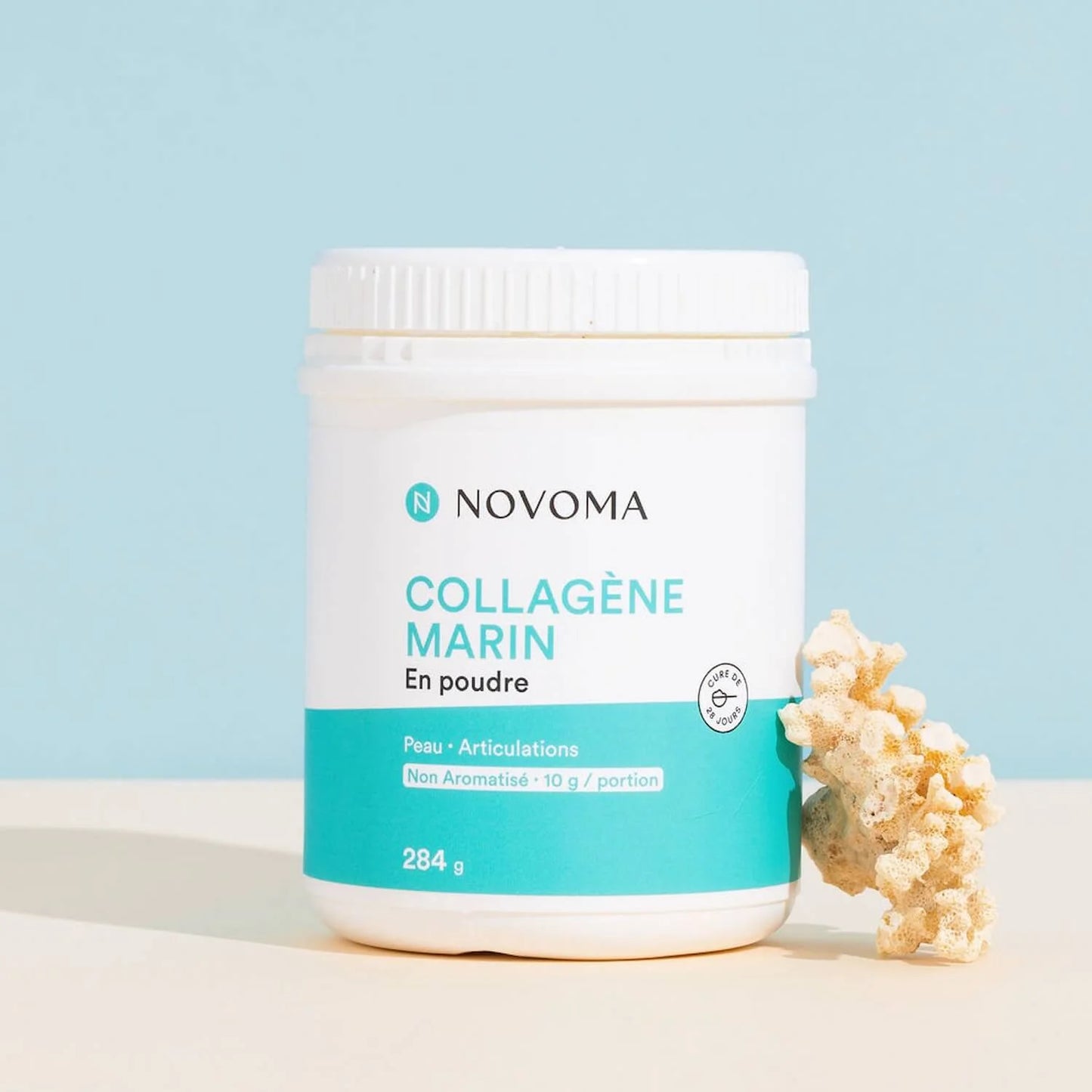Marine Collagen Powder
- Promotes skin hydration.
- Fights the signs of aging
- Contributes to joint mobility






- 10% off your purchase
- Home delivery at reduced prices
- Flexible and without commitment
Couldn't load pickup availability


Promotes skin hydration and joint comfort
Couldn't load pickup availability
Proven effectiveness
Study carried out on a panel of 40 consumers for 10 g of Naticol® per day for 12 weeks.
Presentation of collagen powder
Is your skin lacking firmness and elasticity? Are your joints sensitive?
This may be the consequence of the decline, from the age of 25, of the body's natural production of collagen. However, this key protein, essential for the structure and regeneration of connective tissues (skin, bones, tendons, ligaments, etc.), plays an essential role in preventing the signs of aging. It promotes hydration and elasticity of the skin while helping to maintain joint comfort.
Our formula, enriched with vitamin C, offers you an ideal dose of 10 g of hydrolyzed marine collagen type I and III Naticol®, pure and bioavailable (2000 Daltons), whose effectiveness has been clinically proven.
Easy to integrate into your daily life, our collagen powder, perfectly soluble, odorless and tasteless, mixes easily into the cold or hot drink of your choice. Pour, stir, taste and enjoy!
Why our collagen powder?
Naticol® Marine Collagen Powder – 2000 Daltons
We have selected Naticol® hydrolyzed marine collagen peptides (type I and III), manufactured in France through a gentle enzymatic hydrolysis process. This innovative method guarantees low molecular weight peptides (2000 Daltons) for optimal absorption by the body. Renowned for its purity, bioavailability, and excellent traceability, this marine collagen powder contains no additives and preserves the integrity of the proteins.
Clinically proven effectiveness
The effectiveness of Naticol® marine collagen on skin and joints is scientifically proven. A daily intake of 10 g for 8 to 12 weeks improves skin hydration (+22.8%), elasticity (+23.7%), and reduces wrinkles (-11%). It also supports joint mobility and helps reduce joint discomfort in seniors.
Responsibly sourced – Friend of the Sea® certified
Our collagen comes from sustainable fishing certified by Friend of the Sea® and carries the “Clean Label” certification, guaranteeing no artificial additives and complete transparency in its composition.
1-month supply
Each daily dose provides 10 g of marine collagen and 150 mg of vitamin C, which contributes to normal collagen formation. One jar of collagen powder covers a 28-day program. Measuring scoop included.
No fishy smell – 4 flavors available
The collagen powder is odorless and neutral in taste, making it easy to mix into any beverage, hot or cold. It’s available in 4 versions: unflavored, natural caramel flavor, mango flavor, or red fruit flavor.
Who is it for?
Skin beauty
Our marine collagen powder is designed for anyone looking to preserve the youthfulness and radiance of their skin. Suitable for all skin types – dry, normal, combination, oily, or mature – it helps maintain good hydration, improves elasticity and firmness, and fights visible signs of aging such as wrinkles and loss of skin tone. It contributes to smoother, plumper, and more radiant skin.
Joints and muscle well-being
Our collagen is also a valuable ally for athletes, whose joints, tendons, and ligaments are highly stressed. It helps support muscle recovery and maintain joint flexibility. It is also recommended for older people, in whom collagen production naturally decreases, leading to joint fragility and reduced mobility.
Directions for use
Dilute 10.1 g (2 level measuring spoons) in 250 ml of the beverage of your choice (water, tea, coffee, juice). Mix well until the powder is completely dissolved. This supplement can be consumed at any time of the day.
For optimal effects, it is recommended to follow this treatment for 3 months.
Ingredients
“Unflavored” collagen: Marine collagen hydrolyzate ( fish ) (Type I, III) Naticol®, sodium ascorbate (vitamin C).
Collagen "caramel flavor", "mango flavor" and "red fruit flavor": Marine collagen hydrolyzate ( fish ) (Type I, III) Naticol®, natural flavor, sodium ascorbate (vitamin C).
Precautions for use
This supplement is not suitable for vegetarians and vegans (marine collagen from fish). Results may vary from person to person.
Not a substitute for a varied and balanced diet and a healthy lifestyle. Do not exceed the recommended daily dose. Keep out of reach of young children. For adults only. Store in a dry place, away from heat and light.
The composition

Naticol® Marine Collagen Type I and III
Vitamin C
- Naticol® Marine Collagen10 g
- Vitamin C (sodium ascorbate)150 mg
- Naticol® Marine Collagen-
- Vitamin C (sodium ascorbate)188%
Origin
Supplier

When will I feel effects?
-
Each day
Take 2 measuring spoons in the drink of your choice (water, tea, coffee, fruit juice, etc.).
-
1 month
You notice the first effects on your skin and joints.
-
2 months
You are on the right track for optimal results, don’t stop now.
-
3 months
This is the recommended duration of the treatment. Your skin is visibly more hydrated, and you have gained in joint comfort.
Our tip: consider subscribing to automatically renew your treatment, saving 10% on each order. I subscribe
Our customers reviews
Our answers to your questions
Marine or bovine collagen: how to make the right choice?
What fish does your collagen come from?
Which type of collagen to choose: Type I, II, or III?
What is hydrolyzed collagen?
Is your collagen pure?
Does your collagen have a low molecular weight?
What is the protein content of your marine collagen?
Why combine marine collagen with vitamin C?
Are the flavors used natural?
Does marine collagen contain calcium, iodine, phosphorus or potassium?
What is the recommended daily dose of collagen powder?
Does collagen have a particular taste or smell?
How long should a marine collagen treatment last?
Can marine collagen be taken continuously, or should I take breaks?
Does collagen degrade when mixed with a hot beverage?
Is collagen suitable for people following a vegetarian or vegan diet?
Do you offer vegan or vegetarian collagen?
Collagen powder or capsules: which one to choose?
Is collagen compatible with spirulina?
Can I take hyaluronic acid along with my collagen treatment?
Does collagen really work?
How long does it take to see visible effects on the skin and joints?
Does your collagen help reduce wrinkles?
At what age should I start taking collagen?
I am an athlete: what are the benefits of taking collagen?


If you can't find the information you are looking for, please feel free to consult our FAQ or chat 24/7 with our WhatsApp chatbot. You can also contact us:








